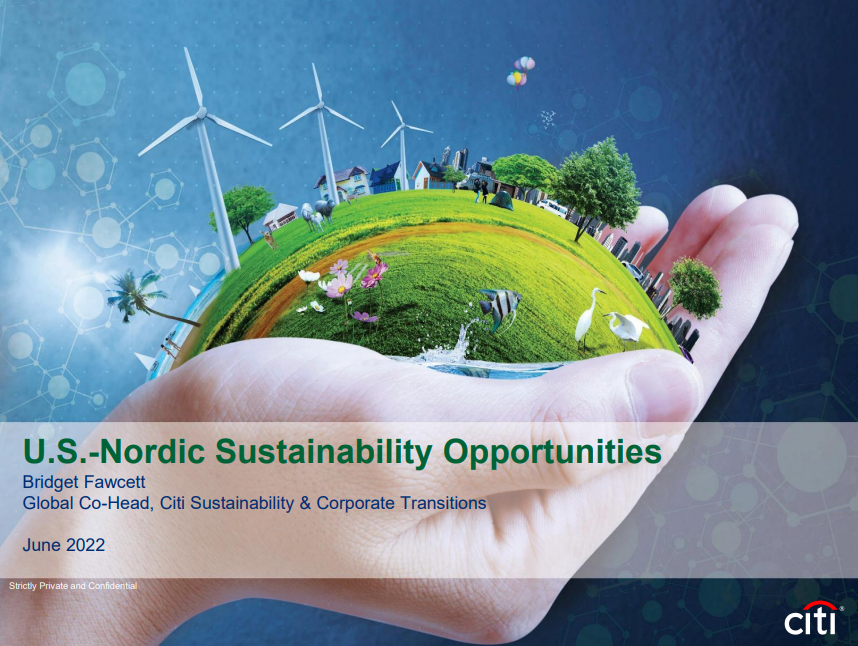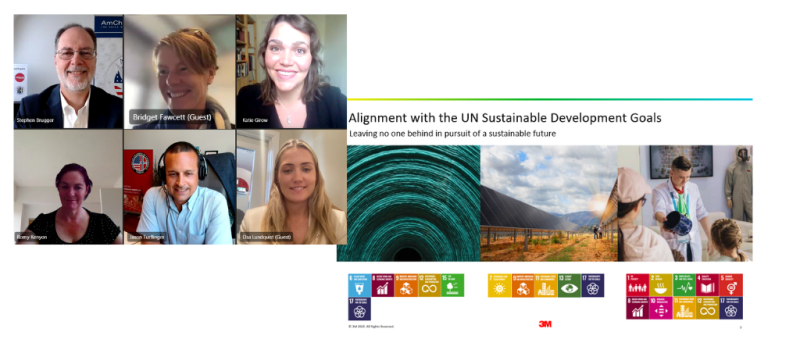AmCham Nordics Webinar: Sustainable Transatlantic Impact with Citi and 3M
AmCham Norway, in partnership with Citi, 3M and fellow Nordic counterparts , were pleased to invite the Nordic AmCham community to a conversation with Bridget Fawcett, Global Co-Head of Sustainability & Corporate Transitions Investment Banking at Citi, and Romy Kenyon, Senior Sustainability Manager EMEA at 3M.
Sustainability as a Growth Engine
Back by popular demand and from her unique Citi perspective, New York-based Bridget Fawcett provided updates on the evolving US regulatory environment, government support for key technology sectors and the implication of sustainability commitments for capital flows and capital access for sustainable companies.
Citi, who has partaken on the sustainability journey for over 20 years, announced in 2021 its commitment to Net Zero financed emissions by 2050, and a pledge of $1 trillion Sustainable Finance by 2030 goal to help advance the UN SDGs.
Commenting on US-Nordics transatlantic foreign direct investment (FDI), Fawcett explained that the Nordic countries combined constitute the 10th largest source of FDI in the US. Most recent annual data shows that bilateral FDI grew in both directions between 2016 and 2020, with a 21% increase into the Nordics, and 34% increase into the US over the past five years. Fawcett believes the strong co-investment is due to a shared value system around sustainability and shared competency recognizing the growth agenda of the transitions that are underway.
Speaker

Bridget Fawcett


A member of the World Economic Forum’s Task Force on Financing the Transition, Fawcett also recognizes the shared commitment around net zero goals, with a further expected increase in FDIs due to the sheer opportunity that the transitions, mainly within energy, represent.
Comparing advancements from our conversation one year ago prior to COP26, and the emergence of a new environment colored by covid and the war in Ukraine, one key finding is the new ‘S’ in ESG: sovereign and corporate security within food, supply chain and energy at top of the agenda.
There are barriers to financing climate solutions at scale and public sector support is critical. Solutions exist, such as the Biden Executive Order for $65bn of low-carbon goods and service procurement and the First Movers Coalition. Realized and predicted numbers will and do reflect the shared objectives of the US and the Nordics continuing to drive transition champions and enable growth on both sides of the Atlantic.
Driven by Purpose, Accelerated by Demand
Romy Kenyon consults all 3M businesses and EMEA regions to support businesses in using ESG criterial, including sustainability, as a key market differentiator. She vividly recounted how the awareness around sustainability in her interactions with stakeholders has shifted tremendously over the past five years, going from somewhat important to the core of innovation.
With a product line consisting of over 70,000 products selling in all parts of the globe with manufacturing sites in over 150 countries, 3M is a truly global company leveraging their position to lead and innovate for a more sustainable, ethical future. By applying science, they design solutions with less materials, advancing a circular global economy, innovate to accelerate global climate solutions, and create positive impact, leading with a purpose.
Kenyon explained how customers’ increased request to see evidence of sustainable adaptations is driving sustainability trends including net zero, circular economy, clean energy, and ESG regulations, much of which is promoted by the EU. As a collective, 3M, their clients, customers, and suppliers are exploring new manufacturing and economic systems, with innovation and technology driving the solutions. A market leader in many of the markets in which 3M operates, customers seek 3M’s guidance on sustainability-related issues.
Speaker

Romy Kenyon


In addition to the performance requirements of the products, customers expect the products to meet sustainability requirements. In their product development, 3M explores alternative materials and opportunities to manufacture more locally for security of materials and supplies. The trend is shifting towards smaller factories in local regions, as opposed to a global model, which has the added benefit of reducing carbon footprints. Customers also seek transparency around the source of the products along the value chain, including the wellbeing of persons involved in the production process and treatment of staff. In addition, the products’ end of life are considered; whether they will be repurposed, reused, or recycled.
In 3M’s Sustainability Value Commitment (SVC), each new product must detail how it drives impact for the greater good. This can include the use of sustainable materials and processes and reformulation of existing products to help customers be more sustainable in their operations or product use, or products that enable new business models or market shifts where spare parts are being repurposed, in the creation of e.g., custom-fitted objects. According to 3M’s ethos, not only must the products be right but, but the company must also do right by including diversity, equity & inclusion as a company culture component.

Functional Always active
Preferences
Statistics
Marketing
tel.: +47 22 41 50 10 | amcham@amcham.no | Sitemap | Privacy Policy | Designed by Flagship
AmCham © 2025
